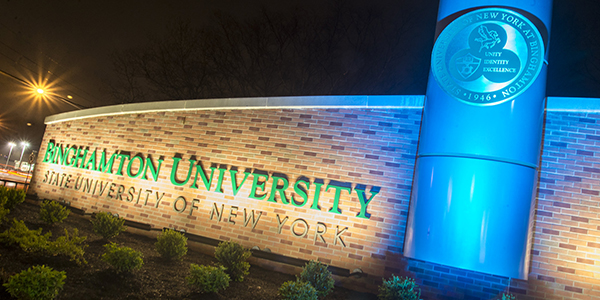Five students receive George Floyd Scholarship for Social Change

On Tuesday, Sept. 15, five Binghamton University students learned they are receiving crucial support and recognition of their efforts to advance a racially just and equitable society.
During George Floyd’s memorial service June 4, the president at North Central University in Minneapolis announced a scholarship in Floyd’s name and called on universities across the nation to do the same.
Binghamton University rose to the challenge. The Binghamton University Foundation board of directors, in partnership with University President Harvey Stenger, designated $1.5 million to establish the endowed George Floyd Scholarship for Social Change to support historically economically disadvantaged, underrepresented minorities.
Recipients receive at least $5,000 per year, for up to three years, in recognition of their demonstrated activity and/or achievements related to social change, restorative justice or racial equality.
“It is my hope that this scholarship will help to provide our students the additional resources they need to assist with their academic success; and to recognize their efforts to affect real change toward social justice now and in the time to come,” Stenger said. “These talented students will be the next generation of leaders and advocates, continuing Binghamton’s legacy of civic engagement and commitment to the community.”
“We recognize there is more work to be done on the journey to equity in our country,” said Sheldon I. Goldfarb ‘73, chair of the Foundation board. “That’s why it is important that we invest in the future of diverse leaders. With this scholarship, we are supporting educational opportunities for driven and talented students who are making positive changes in our world. On behalf of the Foundation, my congratulations to this year’s recipients.”
The students selected for academic year 2020-21 are:
- Claudian Francis ’22, who designed her own major in social sciences as part of the Individualized Major Program. She developed The State of Black College America and Coronavirus, sponsored by the Multicultural Resource Center and the Division of Diversity, Equity and Inclusion at Binghamton, for national Black leaders to come together and discuss ways the coronavirus is affecting minority communities and provide equitable and feasible solutions for Black college students on how to move forward during these times.
- Micah Jumpp ’21, MA ’22, who is in the accelerated/4+1 degree program in geography. She has challenged her hometown school district to review its curriculum and books, teach complete and accurate histories of Black, indigenous and people of color (BIPOC), and create equity spaces for BIPOC and LGBTQ+.
- Celine Lodge ’21, a double major in nursing and psychology, who is a McNair Scholar conducting research to investigate the relationship between perceived discrimination in healthcare and practicing preventive health behaviors among African Americans with citizenship status differences. As a volunteer at a hospital where the majority of patients are minorities, she designed and administered a patient satisfaction survey relating to patients’ comfort level and quality of care. She used the data to facilitate improvement plans on the medical/surgical floor where she was stationed and helped ensure patients were being heard and receiving quality care no matter their racial background.
- Anita Oduro ’22, who is majoring in psychology and has participated in several student organizations that provide local community service, including the step team X-Fact’r, which has performed regularly at a local middle school. She has also been a host/mentor for the Juvenile Urban Multicultural Program (JUMP), which guides and fosters underprivileged eighth-grade students of African American and Latinx descent to strive for higher education.
- Jelani Pusey ’22, a major in economics, who is treasurer of the Caribbean Student Association at Binghamton, which is raising money for the Caribbean Equality Project, a nonprofit agency serving the Caribbean American LGBTQ+ community in New York City. He also volunteers virtually at a Bronx charter school for the arts, mentoring and educating low-income Black students in mathematics, and encouraging them to embrace their culture and learn about their history.
“This was a wonderful opportunity to learn the ways our students are engaging to change the world through social activism and community service,” said Karen A. Jones, University vice president of diversity, equity and inclusion. “Selecting five students was challenging, as it would be great to award all 84 applicants; however, there is comfort knowing the recipients are a reflection of all who applied.”
